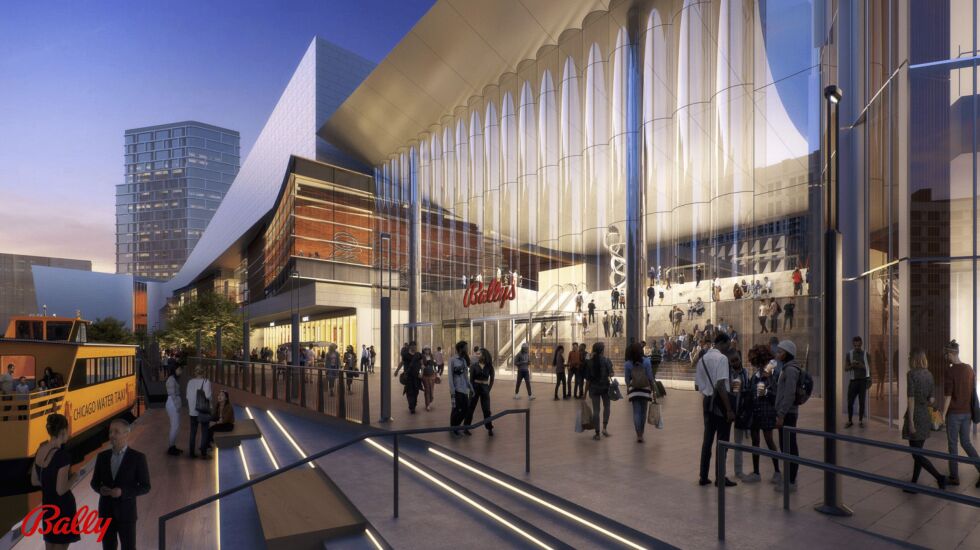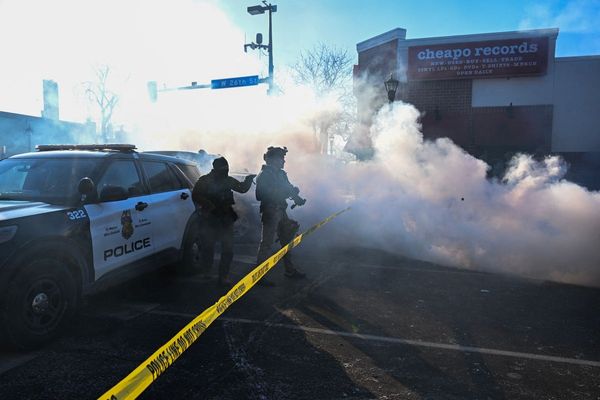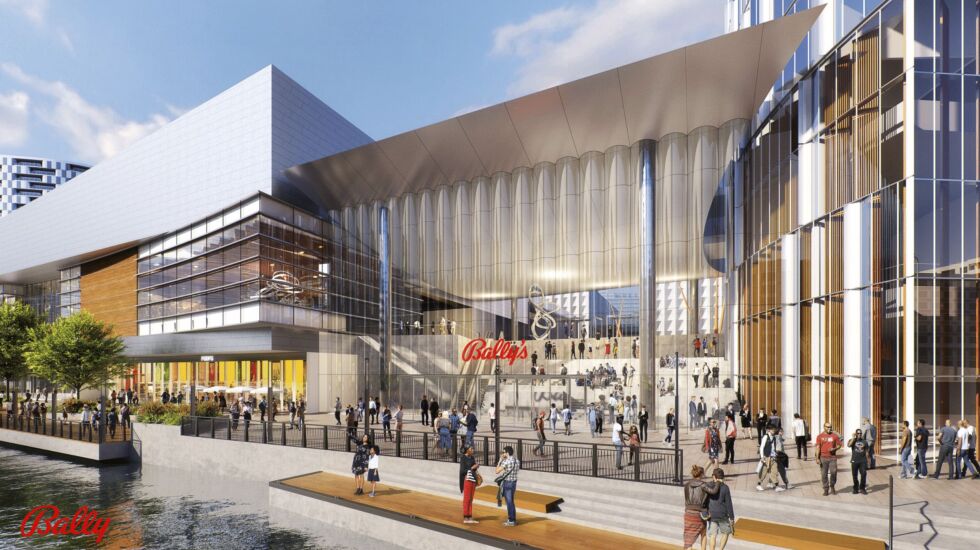
Chicago’s 30-year quest for a casino and entertainment complex is drawing to a close, amid hopes it will produce the jackpot needed to bail out police and fire pension funds.
Less than three weeks after Mayor Lori Lightfoot put her chips on Bally’s $1.7 billion River West bid, the City Council authorized Bally’s to build a permanent casino at Chicago Avenue and the Chicago River and open a temporary casino at Medinah Temple in River North.
The vote came after a 90-minute debate that, at one point, devolved into a screaming match between Lightfoot and Ald. Byron Sigcho-Lopez (25th), a casino critic.
The council also signed off on a host agreement that includes a “labor peace” pact and Bally’s commitment to pay its construction employees and permanent casino workforce a “living wage.”
That same agreement also codifies the $40 million upfront payment that will be placed in a “lock box” for police and fire pensions and other financial, contracting and hiring commitments.
That includes a $2 million contribution to public safety at a temporary casino and $1 million for public safety at the permanent site. The other $1 million will be earmarked for “community benefits” to be determined by local Ald. Walter Burnett Jr. (27th).
“Here we go. Put your seatbelts on,” Zoning Committee Chair Tom Tunney (44th), who led the casino committee, told his colleagues as debate began shortly before 1 p.m.
Wednesday’s 41-7 vote followed a frenzied week of casino votes at City Hall.
After the lopsided vote, Lightfoot thanked labor leaders from the rostrum for helping her to deliver a Chicago casino after decades of “futility.”
Now, Lightfoot gets to campaign for reelection by touting a job-and-contract-generating project that eluded her predecessors — if the Illinois Gaming Board quickly signs off on the deal.
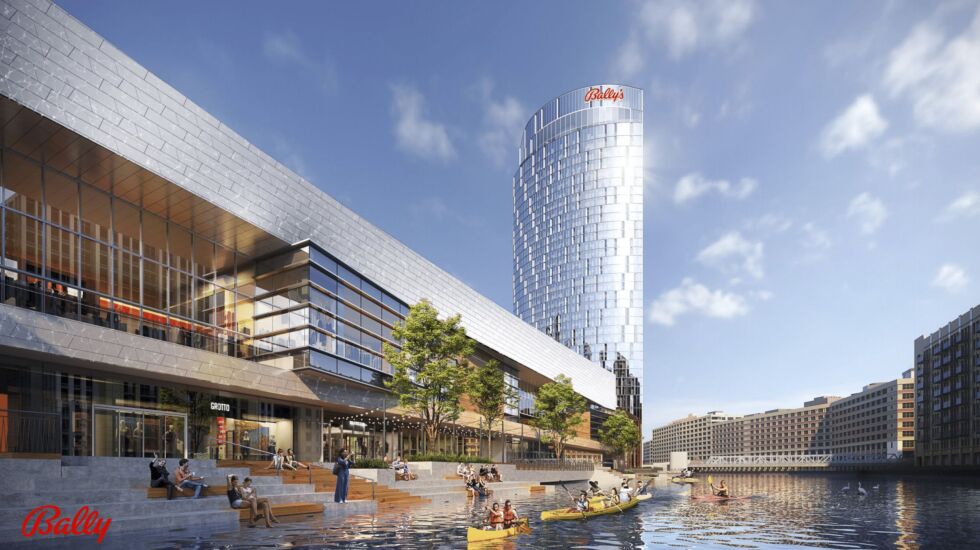
Passage on Wednesday was set up by a dizzying schedule of votes on Monday.
The council met Monday, recessed, and then the Bally’s plan was muscled through Lightfoot’s special casino committee hours later. The full Council reconvened late in the afternoon to defer and publish the casino package, teeing up the Bally’s plan for Wednesday’s final vote.
It was a schedule without precedent — even for a City Council long known as a rubber stamp.
Ald. Brendan Reilly (42nd) had even invoked the dreaded “P-word” — the deal Chicagoans love to hate that privatized the city’s parking meters — to describe the legislative process used by a mayor who campaigned on a process of openness, transparency and community input.
“This has gone far too quickly at a breakneck speed. The last time we did something like that, we got burned on it,” Reilly said Wednesday.
“All of us have been put in this pressure-cooker artificially. Folks just want to get it done quick. ... This is moving too quickly.”
(The city in 2008 leased its metered spots for 75 years to a private company. Taxpayers got $1.16 billion up front. As of last June, the private investors already had raked in nearly $1.7 billion, with six decades left to go.)
Mayoral challenger Ray Lopez (15th) argued that mayoral politics is driving the mad rush.
“$40 million is what we’re rushing for. ... We’re rushing because we need a positive spin for 2023. That’s what this is about,” Lopez said.
For Reilly and neighboring Ald. Brian Hopkins (2nd), it was an uphill and ultimately futile climb against the formidable lobbying muscle of organized labor.
They failed to convince their colleagues despite a multi-pronged approach arguing:
• A River West casino on the site of the Chicago Tribune’s printing plant at Chicago Avenue and Halsted Street will create an impossible bottleneck in an already congested area.
• Bally’s has never built a casino from the ground up.
• Lightfoot created a casino committee to give herself “political cover” — then went around it, anyway, since she’d already made her decision.
Reilly is equally dead-set against the idea of turning Medinah Temple, 600 N. Wabash Ave., into a temporary gambling den, at least through the first quarter of 2026, or exempting Medinah from the liquor moratorium on that block.
He argued Lightfoot’s eleventh-hour “switcheroo” to the landmark building as the temporary site will fuel an ongoing spike in River North crime, and that the already-congested area can’t handle the influx of traffic.
“It’ll be a liquor license like no other in the city. A minimum of 20 hours,” per day, Reilly said Wednesday.
“That’s a big deal. When the nightclubs shut down, that’s when all of the nonsense starts.”
Those arguments were rather easily trumped by the promise of a bonanza of jobs and contracts for minorities and women and the mayor’s warning that the only alternative to keep police and fire pension funds from going bankrupt was a preelection property tax increase.
“It’s better than trying to get it from taxpayers,” said Ald. Walter Burnett (27th), whose ward includes the permanent casino site.
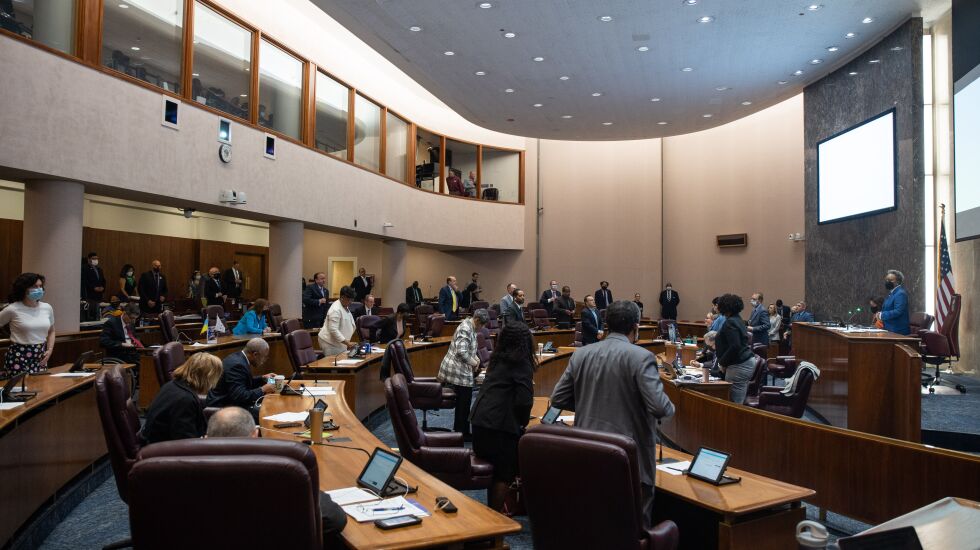
Black Caucus Chair and Casino Committee Vice-Chair Jason Ervin (28th) noted that the city has $1 billion in pension obligations to meet next year alone.
“This revenue source is one of the last available to this city short of raising property taxes,” he said.
Ervin said an innovative “crowd-sourcing” investment plan that Bally’s has yet to fully explain will give everyday Chicagoans a chance to get a piece of the action.
“I’m extremely proud to hear about the opportunity where Ms. Jones and Ms. Jackson and Ms. Lopez will have an opportunity to be part of something that has eluded the city of Chicago for years,” Ervin said.
Hopkins countered that Bally’s had an “unfair advantage” and the company’s bid was “by far the least desirable” of the three finalists.
“This is a mistake and the ramifications of this mistake will continue on into the future,” Hopkins said Wednesday.
Conceding that the mayor and organized labor have the votes, Hopkins said, “I urge you not to make this mistake while we still have a chance so we can do better. I think we can.”
The debate got loud and turned ugly when Sigcho-Lopez accused Lightfoot of being “more worried about campaign contributions than doing the right thing for the city of Chicago.”
That’s when the mayor lost it.
“You are a liar. You are a liar, sir. And you are out of order,” the mayor said.
Notoriously thin-skinned, a seething Lightfoot then raised her own voice as Sigcho-Lopez shouted back at her from the Council floor.
“I will not tolerate you besmirching the hard work of so many people who have worked on this. You may not agree. Then, vote no. But I will not sit here silently while you besmirch my reputation and the people that work for me from your pettiness and the things that you’re trying to do that expose this city to liability, sir,” Lightfoot told Sigcho-Lopez.
“You are out of order. You can express your comments and your views. But you will not tear down the integrity of people who are working just as hard as you are. That is absolutely unacceptable.”
As he did earlier this week, Reilly accused the Lightfoot administration of putting too much weight on the $40 million upfront payment and not enough on what he portrayed as Bally’s pie-in-the-sky revenue projections.
He argued the casino must perform “on super steroids” to generate the $200 million in annual revenue the company has promised by 2027. Reilly doesn’t believe those “rosy” projections and the company’s “fuzzy” math. Instead of taking Bally’s word for it, Reilly urged his colleagues to slow down and hold out for a minimum annual guarantee.
Chief Financial Officer Jennie Huang Bennett has argued that the percentage makes more sense than mandating an annual payment “despite whatever the economy may be in the future.”
After creating a special council committee to consider “all things” casino and stacking it with her hand-picked committee chairs, Lightfoot played her hand with Bally’s in May before the casino committee even had a chance to weigh in.
Her administration’s review showed its revenue estimates were slightly higher than competing projects, with a shorter projected turnaround time.
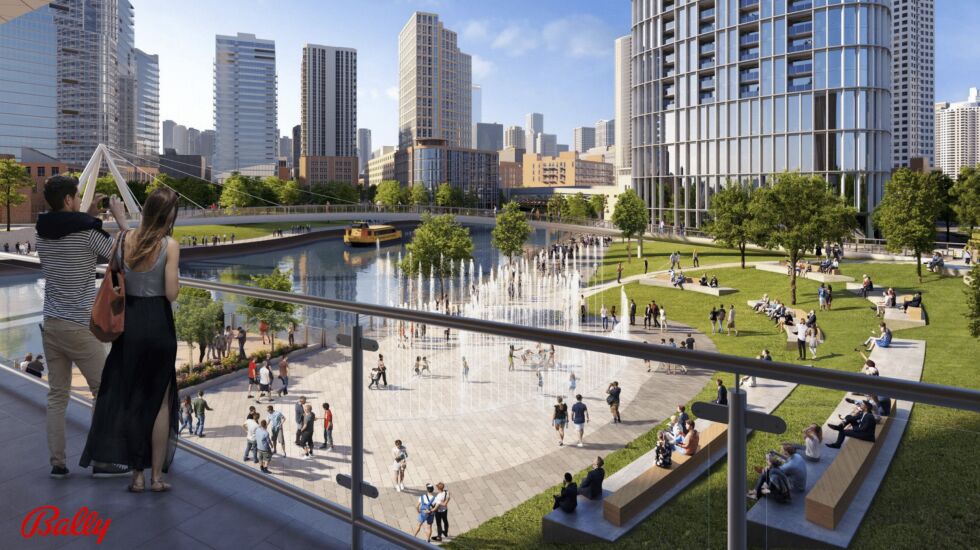
City officials also emphasized Bally’s has no competing casino interest in the Chicago area. Finalists Rush Street Gaming and Hard Rock Casino operate in Des Plaines and Gary, Indiana, respectively.
Bally’s has proposed 3,400 slots, a 3,000-seat entertainment center, a hotel with up to 500 rooms, a 1,000-seat outdoor music venue and exhibition space including a Chicago sports museum.
The 30-acre site has the Chicago Tribune’s newspaper printing plant, where the Chicago Sun-Times also is produced. The plant could move. Bally’s Chairman Soohyung Kim also raised the possibility of it remaining on part of the property.
The Rhode Island gambling company’s deal calls for it to start taking bets at Medinah Temple within a year of Illinois Gaming Board approval, and to complete its massive casino-resort within three years.
Bally’s would pay the city for lost revenue if that rigid timetable is not met.
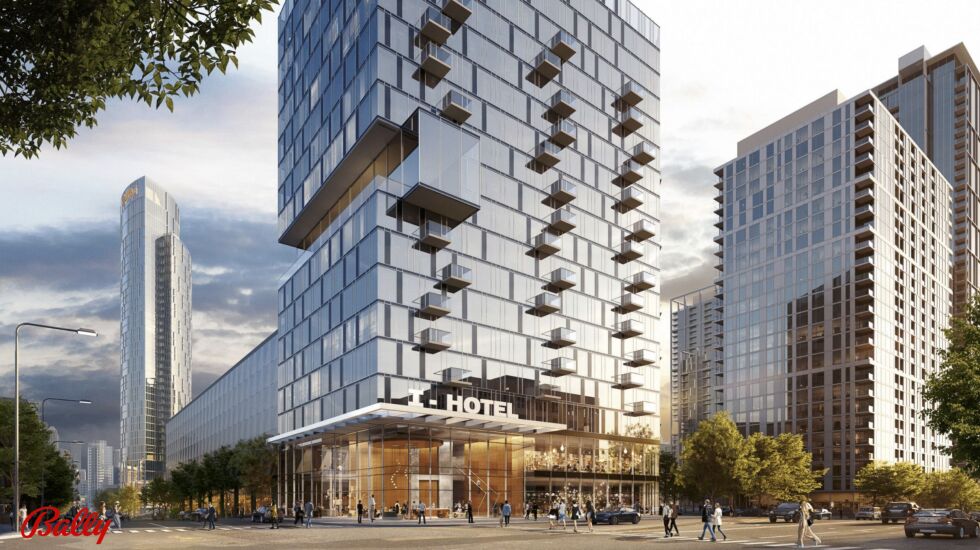
In 1989, then-newly-elected Chicago Mayor Richard M. Daley opted out of Illinois’ riverboat gambling law.
Three years later, Daley did an about-face, embracing a $2 billion casino and entertainment complex proposed by three Las Vegas gaming giants. That was followed by decades of futility in Springfield as Daley and his successors tried to convince several governors and the Illinois General Assembly to authorize a Chicago casino.
